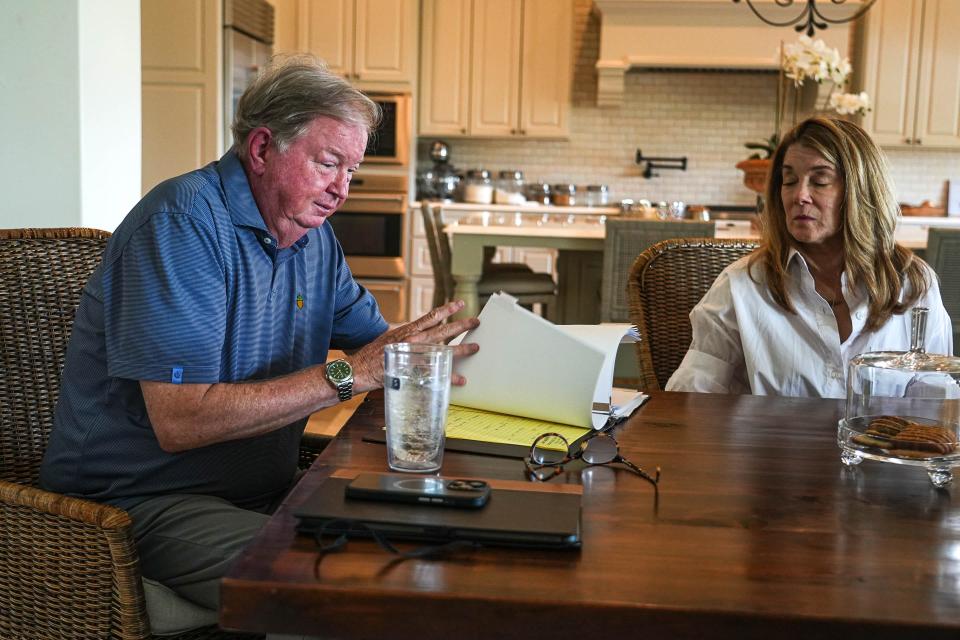3 tips for homeowners to prevent becoming victims of property deed fraud
On Sunday, I shared the story of Greg and Jennifer Thompson, a couple dealing with the nightmare of a stranger trying to claim ownership of their Austin-area home.
Someone using a fake name, phony signatures, a doctored notary stamp and an electronic document filing service filed a fraudulent property deed in late May. This document claimed the Thompsons had sold their home.
A Travis County sheriff’s detective promptly determined the record was forged. But as I explained Sunday, correcting the official records is a burdensome process that falls squarely on the victims, requiring them to go to civil court at their own expense.
The Thompsons have spent more than $10,000 in attorney’s fees, and still the records maintained by the county clerk and the appraisal district show the couple’s home as belonging to a phantom buyer.
Grumet: Forged deeds come cheap. Getting your home back in your name will cost you.
“It's uneasy. It's unsettling,” Jennifer Thompson told me. “We hope nobody comes to the door to tell us this is their house.”

What can homeowners do about this?
The Sunday piece focused on the need for legislative action to provide a better path for victims. But I also want to share some tips for homeowners that didn’t make the print edition.
For starters: Experts say the criminals running these scams tend to target properties without a mortgage, which makes it easier for them to try to sell it or borrow against the site.
Some steps you can take:
Check yourself. Just like people check their credit cards for any unauthorized charges or check their credit reports for any unfamiliar accounts, it’s a good idea to periodically check the property appraiser’s database to ensure your home still bears your name. Visit the Travis Central Appraisal District at traviscad.org; the Williamson Central Appraisal District at wcad.org; or the Hays Central Appraisal District at hayscad.com.
Sign up for alerts. Property owners in Williamson and Hays counties can sign up to receive free, automatic alerts anytime a property record with their name is filed. The Travis County clerk’s office plans to offer a similar service starting next spring, once it has a new computer system in place that can provide that function. For Williamson County's alert system, visit wilcotx.gov/298/Fraud-Alert-System-Sign-Up. For Hays' alerts, visit hayscountytx.com/departments/county-clerk.
Report a problem. Call the police if you find signs of fraudulent activity with your property. Law enforcement can try to pursue a criminal case. But getting the official record corrected involves going to civil court at your own expense.
What else should lawmakers consider?
The victims of property deed fraud shouldn’t have to spend thousands of dollars to go to court just to get their property back in their own name. I suggested a couple of ideas for lawmakers, including allowing the attorney general or district attorney to represent such property owners at no cost, or creating a process for property owners to petition a judge directly.
Reader Larry Silvey offered another intriguing idea: Lay out some legal responsibility for the electronic filing companies that submit two-thirds of the official records pouring into Travis County.
While the clerk’s office recently started checking the IDs of people recording documents in person, the clerk relies on vendors’ diligence for electronically filed documents. All those fraudulent documents identified this year in Travis County came through Utah-based Simplifile, which told me it has a “know your customers” policy but wouldn’t explain what that entails.
Silvey suggested a two-pronged change to the law: Require e-filing firms to verify the ID of the client submitting the document. And hold the firm liable for any expenses, including court costs to correct the official records, if the e-filing firm fails to check ID and a fraudulent document gets in.
That would get their attention, wouldn’t it?
Grumet is the Statesman’s Metro columnist. Her column, ATX in Context, contains her opinions. Share yours via email at bgrumet@statesman.com or via Twitter at @bgrumet. Find her previous work at statesman.com/news/columns.
This article originally appeared on Austin American-Statesman: How homeowners can prevent becoming victims of property deed fraud

